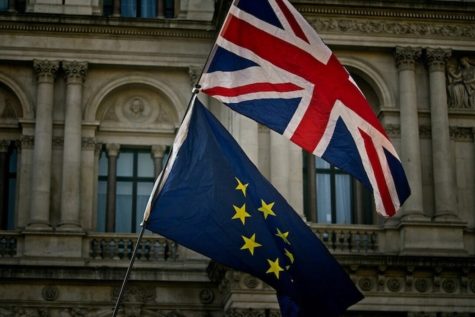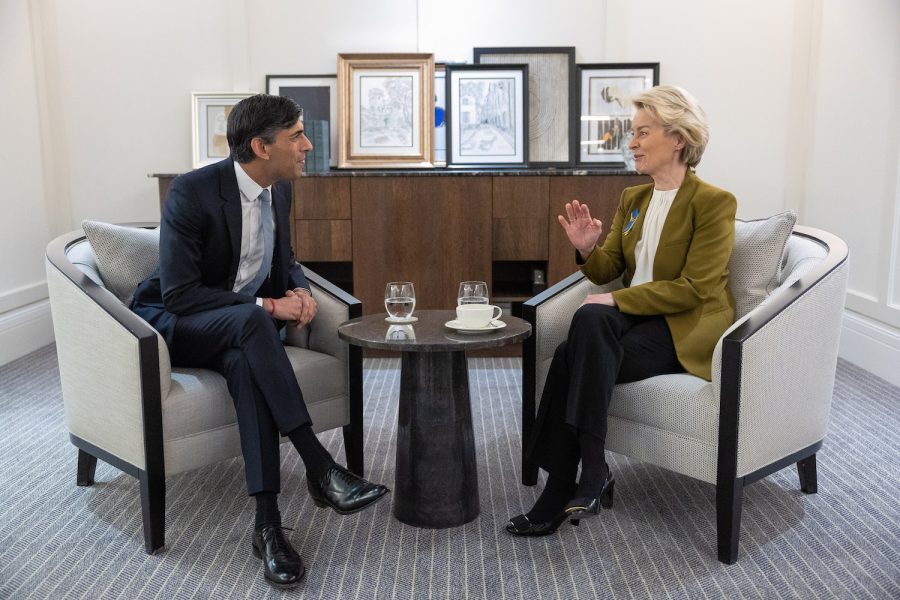U.K. Prime Minister Rishi Sunak and President of the European Commission Ursula von der Leyen have announced a new deal called the Windsor Framework to fix post-Brexit trade problems in Northern Ireland Feb. 27, according to AP News. There has been a long-term issue regarding the limitations on Northern Irish trade as a result of specific terms from Great Britain’s exit from the European Union Jan. 1, 2020.
Marcus Chae (’24) said the terms in Britain’s Brexit agreement did not acknowledge Northern Ireland’s trade market appropriately.
“One part of it that’s always overlooked is the issue of Northern Ireland and the Irish border,” Chae said. “For the past two years, they have been struggling and I think that Northern Ireland has been neglected by the terms of Brexit.”
Chae said the new deal “offers some more leniency for businesses in Northern Ireland” and will help improve the Northern Ireland market.
The new deal includes a lane system for goods from Britain en route to Northern Ireland. According to gov.uk, the new green lane allows traders shipping goods to Northern Ireland to avoid needless paperwork, inspections and fees by using only standard commercial information.
Furthermore, according to the U.K. Parliment, the red lane goods deemed to be heading on to Ireland will have to use the red lane protocol upon arrival from Great Britain to Northern Ireland and will be subjected to full E.U. customs.
Performing Arts Teacher Gordon Graham, who is Northern Irish, said the new deal will be impactful as Northern Ireland has a large reliance on trade overproduction.
“The Northern Ireland economy depends on trade,” Graham said. “Most of its trade comes in and it depends on the Westminster Government for subsidies. It’s not an industrial powerhouse, so there isn’t much production.”
Chae said the terms of the deal will be beneficial as it will uplift trade in Northern Ireland while also adding efficiency to the border control checking system.
“It’s a beneficial solution, especially this idea of the green lane that goes through England and Northern Ireland without too much apprehension from border control,” Chae said. “I definitely think that will increase trade and increase productivity for businesses in Northern Ireland.”
It’s a beneficial solution, especially this idea of the green lane that goes through England and Northern Ireland without too much apprehension from border control.
— Marcus Chae ('24)
Meanwhile, Jemma Granite (’25) said a flaw with the new agreement is the fact that it will create a border between Northern Ireland and the rest of the U.K.
“While there are probably some benefits to having certain items being checked, the deal is still not great as it creates a border between Northern Ireland and the rest of the U.K.,” Granite said.
Grade 12 Dean Duncan Pringle, who teaches AP Economics, said Northern Ireland was in a deadlock position as a result of a lack of agreement by Northern Ireland’s political parties.
“Given the difficulties of the previous years in this issue of Northern Ireland and the challenges that have been thrown up, there has been a lack of a functional agreement and there’s a political stalemate in this region,” Pringle said.
The Democratic Unionist Party is the national conservative political party in Northern Ireland. According to CNBC, the party has resigned in protest over the Northern Ireland Protocol and will need to study the details of the new deal to determine whether it respects and restores Northern Ireland’s place within the U.K.
Pringle said there is a difference between the approaches of the current U.K. Prime Minister Rishi Sunak and Boris Johnson, which will negatively impact the DUP.
“The DUP has less influence politically than they did on Boris Johnson because he was much more of a unionist,” Pringle said. “[Rishi Sunak] seems to be playing less to the DUP and taking a more diplomatic position with the European Union.”
Granite said the deal addresses the regression of the Northern Irish economy while adding efficiency to an aged system.

“The old system was clearly outdated and we needed something like this to come in,” Granite said. “Especially when considering that we now have better resources and the ability to have a more effective system to check goods going through the U.K.”
In addition, Graham said the DUP is extremely conscious of the potential outcome regarding a difference in treatment towards Northern Ireland in relation to the U.K.
“The idea of having Northern Ireland being treated slightly differently from the rest of the United Kingdom is something that the DUP are really sensitive about,” Graham said.
Ultimately, Granite said she appreciates the fact that the deal shows that the U.K. government is striving to make political changes in the hopes of addressing these long-term troubles in Northern Ireland.
“You can always appreciate deals and legislation that specifically address the issues in society,” Granite said. “Overall, this deal shows positive foundational motivations towards the Northern Irish economy by the government.”






